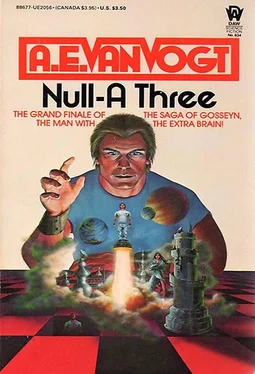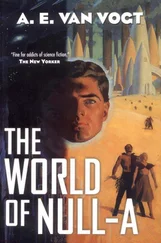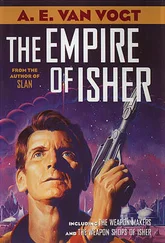Alfred Van Vogt - Null–A Three
Здесь есть возможность читать онлайн «Alfred Van Vogt - Null–A Three» весь текст электронной книги совершенно бесплатно (целиком полную версию без сокращений). В некоторых случаях можно слушать аудио, скачать через торрент в формате fb2 и присутствует краткое содержание. Жанр: Фантастика и фэнтези, на английском языке. Описание произведения, (предисловие) а так же отзывы посетителей доступны на портале библиотеки ЛибКат.
- Название:Null–A Three
- Автор:
- Жанр:
- Год:неизвестен
- ISBN:нет данных
- Рейтинг книги:3 / 5. Голосов: 1
-
Избранное:Добавить в избранное
- Отзывы:
-
Ваша оценка:
- 60
- 1
- 2
- 3
- 4
- 5
Null–A Three: краткое содержание, описание и аннотация
Предлагаем к чтению аннотацию, описание, краткое содержание или предисловие (зависит от того, что написал сам автор книги «Null–A Three»). Если вы не нашли необходимую информацию о книге — напишите в комментариях, мы постараемся отыскать её.
Null-A 3 is destined to become an instant classic — a mind boggling galaxy-spanning adventure!
Null–A Three — читать онлайн бесплатно полную книгу (весь текст) целиком
Ниже представлен текст книги, разбитый по страницам. Система сохранения места последней прочитанной страницы, позволяет с удобством читать онлайн бесплатно книгу «Null–A Three», без необходимости каждый раз заново искать на чём Вы остановились. Поставьте закладку, и сможете в любой момент перейти на страницу, на которой закончили чтение.
Интервал:
Закладка:
“Who appointed you?” Gosseyn asked.
If possible, the great eyes grew even rounder. Then, impatiently: “I appointed myself, of course.” The sudden irritation abruptly produced more words: “Look, our authority system is none of your business.”
Gosseyn rejected the meaning with a gentle shake of his head. Then: “Sir,” he said politely, “you’ve made this entire situation my business by your relentless pursuit of me and your attempt to control me. I should therefore comment that I find your system of government significant. Are you saying, in effect, that no one else was motivated to appoint himself commander-in-chief?”
Pause; then: “Several.” The big eyes stared into his.
“What happened to their acts of self-appointment?”
In front of him the small mouth twisted slightly. Then: “They never reached the appointment stage. When they spoke of their ambitions, nobody listened. So they got the message.”
“I gather that, somehow, you had put yourself over?” Gosseyn spoke the comment in a questioning tone.
The impatience was still there. “Mr. Gosseyn,” the leader said, “you yourself manifest many qualities of a commander. I feel certain that, among the human beings we have aboard, there is not one, considering the particular predicament they are all in, who would not accept your orders. Automatically.”
Particular predicament!
It was a relation-to-statement, and therefore within the General Semantics frame of reasoning.
The words that had been so casually spoken had an additional revelatory meaning:… other human beings aboard—
Aside, of course, from that poor, dumb youth who had served his omelette, it was now fairly certain that the reference was to Mr. and Mrs. Eldred Crang, the Prescotts, Leej and Enro, and the others. They were still alive. Captured but undamaged.
Suddenly, it was sad. Self-appointed leaders. These semi-human-looking people had evolved what had the implication of being an emergency-style system of living with each other. Somehow, in spite of their physical deformity, they had simultaneously achieved a mighty science.
Self-appointed government could work. There was a pragmatism involved that, in most situations, had a potential for almost sensational success.
The self-appointed whatever arriving at a cul-de-sac in his own forward drive—plan—purpose—research; and so not offering a resistance when an assistant asserted leadership by asserting that his—whatever —would work.
There was a sort of things-get-done momentum in such an idea. At least a partial certainty of nothing ever slowing down because a single individual could never for long fool his colleagues. Observably, the project he was working on would either be going forward, or it would not be.
Such a system could conceivably work best in the area of physics and chemistry. The results were always visible; and if a research-leader lagged, there were eager usurpers waiting down the line for the slightest sign of slowdown in creativity.
In fact, the leadership system could explain the superiority of Troog science, on the one hand, and a misuse of it, on the other.
Because, obviously, psychology, and the so-called social sciences, as well as humanitarian ideas, could never be observably true. In those fields, there could, as on earth, be “schools” with the usual variant beliefs. It was in such areas of study that General Semantics offered the individual a method of avoiding the need for certainty.
Nothing like that here, was his feeling-thought.
He was aware of other, similar thoughts crowding up from some equivalent of an inner well of ideas. But before they could take form, the two doors to his right opened again. The five Troog waiters and the human youth entered.
The Troogs were carrying tall, transparent glasses containing a liquid; and in the youth’s hand was a cup and a saucer, and a cream pitcher. Coffee?—Gosseyn wondered.
It was. Quickly set down in front of him by hands that, thereupon, reached over and removed the empty omelette plate. Presumably, particular Troogs picked up the same plates they had set down earlier. Interesting, then, that the human boy, as he withdrew with his alien companions, did not look at Gosseyn.
But his predicament had made an impression. And so Gosseyn gazed after him, and, just before the poor, little guy disappeared, took a 20-decimal mental photograph of him.
His thought was: “As soon as I get this whole situation clarified, so that I can be sure, I’ll put him somewhere on earth—”
CHAPTER 25
It was a slightly flabbergasted Gosseyn who poured in a tiny portion of cream, stirred it, and took the first sip of what tasted like genuine coffee.
In picking up the cup, he saw that there were half a dozen sugar cubes at the edge of the saucer; but the Gosseyn bodies did not use sugar in coffee; so the cubes remained where they were.
It was evidently another instance of a self-appointed Troog studying human needs, and even coming up with coffee. It was the kind of thoroughness which assured that no other Troog down the line of command would be taking over his job.
That was probably also why they had brought the human youth aboard. To help on the finer details.
In such small matters, and in relation to science, the system had its points. But otherwise—
He put his cup down, and gazed at the leader, who, he saw, was sipping liquid from the glass that had been set for him. Gosseyn shook his head at the alien.
“I find it difficult,” he said, “to visualize such a leadership system in relation to important matters. Apparently, back in your own galaxy, the self-appointed super-leader evidently maintains a state of continuous warfare against the Dzan humans.”
Another one of those pauses. All the other Troog eyes stared at their leader expectantly.
Gosseyn waited, as one shoulder of the big body below that head made a movement that could have been described as a shrug. The small mouth said:
“Our Great One,” said the ship leader, “ordered the lesser race to submit itself to his commands.”
Pause. Silence. Finally: “When was this ultimatum given?” Gosseyn asked.
The huge eyes stared at him; and there was a small note of surprise from the voice that issued from the little mouth: “No one has ever asked that question before.”
There were so many implications in the reply that Gosseyn almost literally had to control consciously the wild way his thoughts leaped in every direction. Finally, with a gulp: “Was the ultimatum already in force when you were born?”
“Y-yes!” The hesitation this time was followed by sounds from other Troogs.
He was getting answers, so Gosseyn did not waste time.
“We, here in the Milky Way galaxy, were surprised to discover, when we went out into space, that human beings of various color combinations, inhabited most of the habitable planets—everywhere!
“Recently—” he continued—“we learned that we are descendants of long ago immigrants from your galaxy. The story was that some malignant energy field was moving in upon that galaxy. At the time millions of small spacecraft were constructed. Each contained two men and two women in a state of suspended animation and with life support systems for the long journey from your galaxy to this one.
“Now, with the arrival of the Dzan battleship and your battleship, we deduce that those persons who stayed behind, because there were not enough spacecraft to transport everybody—that, I repeat, those who remained were not destroyed, as was believed would happen.”
He drew a deep breath, and concluded, “Have you any explanation for the fact that, apparently, two human races—the Troogs and those who are like us here—survived the threatening catastrophe?”
Читать дальшеИнтервал:
Закладка:
Похожие книги на «Null–A Three»
Представляем Вашему вниманию похожие книги на «Null–A Three» списком для выбора. Мы отобрали схожую по названию и смыслу литературу в надежде предоставить читателям больше вариантов отыскать новые, интересные, ещё непрочитанные произведения.
Обсуждение, отзывы о книге «Null–A Three» и просто собственные мнения читателей. Оставьте ваши комментарии, напишите, что Вы думаете о произведении, его смысле или главных героях. Укажите что конкретно понравилось, а что нет, и почему Вы так считаете.











